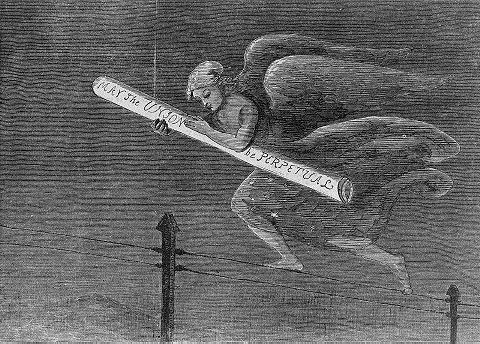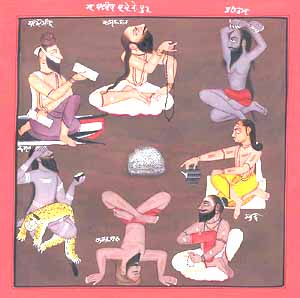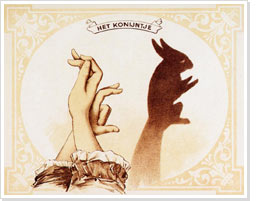1874
[1] [2] history and timeline- telegraph
An open plain surrounded by hills. As the studio lowers itself, a network of telegraph poles come in view like trees from another planet. Egrets walk on the grass like scattered rice grains. The studio pauses alongside a ceramic cup on the telegraph pole, which looks like it is waiting to catch some nectar from heaven.
Saraswati:
On the lines hanging between these tall dusty poles with ceramic cups
Dada:
Made by art students like me!
Saraswati:
Between these sky borne tracks, glided an invisible angel. They said she was beautiful as the winged horse that flew Mohammed and his word over the world. She was the Queen's special angel, the telegraph, she was the message and the messanger, the signal and the train itself, a ghost train with invisible bogies for whom these celestial tracks had been laid.
Dada: Villagers often pressed their ears to the poles and reported hearing sounds of the sea. The Queen's armies had come disguised as sea merchants, and now that same sea seemed to be singing in these hollows. Once upon a time they were rapacious traders, the British, they would have children with local girls and sully the caste. But for a long time now they have been mysterious, few, distant, like a select family of invincible aliens who are here only to rule.. They are very knowledgable about our culture sometimes, some of them are very good. But you must never completely trust them. Because they belong together, however scattered they might seem. Even the gods are kinder, closer to us, more revealing in their follies, more decipherable than these rulers!
A brief note on the Telegraph in India.
Alexander Lodygin gets the Russian patent for his filament lamp.
Dadabhai Naroji becomes Dewan of Baroda
Dada and the children by the windows. He points out the stars to his children- see, Vishvamitra, Jamadagni, father of Parsuram, Bhardvaja, Gotama
Neelkantha: Higher, higher, can't we go higher?
Prabhakar echoes: haaaya, haaya!
The studio suddenly soars like it went up a ferris wheel and the children fall on the ground and roll, their breath catching before it rushes out with an excited shriek. Silver edged clouds toss about like the old English Queen's hair dressed for a party, at the windows. Dada looks out at Babaraya playing with his siblings and nods his head. Baba smiles.
Saraswati barely manages to balance Srikrishna at her shoulder and comes angrily towards Baba.
Neelkantha gets up first from the floor and staggers to the window. Mandakini is still there, she did not let go of the frame all along.
Mandakini: Can we see the Saptarishis?
Dada comes up behind them and stares out and smiles as he shakes his head.
Dada: See, there they are
And still as far as they were before, are the seven stars of the constellation.
Neelkantha: Again!! Dada
Prabhakar: again!
Neelkantha: Dada Again
Baba is a hero to his young siblings. He grins. He suddenly dives. Dada yells out, suddenly angry.
Dada: Baba! once is enough! This girl was asking me something.
He turns to Neelkantha: Are you monkeys that you must keep flying?
Baba is still, quiet among the tarpaulins hanging down the studio( as though hiding a construction behind). The tin moon hangs over old jute. Baba breathes in the chalky dust.
Dada puts on a lamp
Dada: Do you want to hear the story of the Saptarishis?
There is a sullen silence and a look of guilt in Mandakini's eyes. Dada calls her over. She walks upto him. He looks at the others.
Sarasvatibai: sit down
With a captive audience, Dada begins his story, starting by looking at Mandakini but also looking across to the sullen boys. Babaraya's eyes begin to withdraw. It is a pity, this is a favourite story of Dada's, he cannot help tell it now that he has started, his anger is a surfboard, a part of him stands and wishes he was not telling it this way. Sarasvati tries to help him.
Dada: The Saptarishis watch the world from the outer edges of space. Their second eye looks upon another world on the other side.
Saraswatibai: Really?
Dada: When I was a child, fresh in my being like a young banana leaf, I would lie on the bed at night and stare at the stars wondering if I would suddenly see one of the Rishis.
One day I realised that if those were really the eyes of the seven rishis, then they only had one eye each. Because there were only seven stars. I was terrified. I would lie in a cot in the open and try to look away. And keep returning to them. Imagining seven men with long hair that they had never washed nor cut, that had grown together into clumps like Shiva's jatas. Beards that stuck to their chins and their chests. and under thick hard skin, a shining eye in the centre of their forhead.
Neelkanth begins to whimper. Prabhkar begins to cry. Sarasvati is feeding the baby. She calls out to Prabhakar
Saraswati: It was not real, Prabhu, it was just your father's film. Have you seen the false hair in the prop room- Mahadev, go and get me some beards, no? Maha.. Come here.
When the children come to her, Sarasvati cajoles them
Sarasvati: He was not looking at the sky, he was getting scared of the film he was making in his mind.
Dada: What is there to be afraid, Neelkanth, you must be able to listen. You are growing up now.
Babaraya traces his finger over the studio and takes it to where a small miniature of a pond is there.
Baba: Like I used to run from the water in this little pond. I used to feel it was holding me, shaking, in its arms.. I would run from the glass in front of the camera, from the silence if I stared long enough into Baba's marble eyes
Dada: I would think of the Saptarishis even when I was older, they were like a puzzle of logic. I finally decided one day that they were probably all lying in profile, their other eye facing another world, on the other side. That they were like frogs, with eyes pushed into the sides of their heads.
Saraswati: You decided..
Dada: That is how stories survive generations. By giving our imaginations to our children.
Dada tells Babaraya and Mahadev
Dada: If you were brought up, as I was, as my father was, in Trymbakeshvar, you would know many more stories. You would be one of the room full of soft shaven heads of young brahmans, drowning every morning in the sound of their own chanting. The heavens would lean down and whisper special secrets into your ears, secrets that were yours by caste, you would know the Vedas, and to confirm your knowing them, you would repeat pieces together, every morning, and they would rise like a slow wave around you. You would wrestle in the pit at your school, looking like young eggheads rolling in the sand You would pray together and learn how to make rituals and ceremonies. If I was a practising pandit I could play Chinese Whispers with you
But I never learnt Sanskrit seriously enough. Your grandfather, he was a serious pandit, he knew the secrets of those words, he recited them like music every day.
Babaraya: Mandakini can do your pooja, just the way you do it.
Dada(surprised): She can?
Mandakini stands looking at him, terrified.
Sarasvatibai: No, no, Babaraya why tell such lies? Manda, go wash the kitchen floor for dinner.
Babaraya: Not lying, I have seen her, she makes funny sounds and sits cross legged
Dada is listening to Babaraya, his eyes are tracing Manda's movement as she runs out of the room.
note: We live on a gentle giant called the earth. See him, nainoo, he is a mother. Quiet, with long fingers.. we live in crevices on him. In little furrows, and burrows, in coves, in nests, in little tents pitched in the breezy shade of his hair. The smell of the earth- familiar, no? is his smell. he lies between a sun and a moon that keeps rushing past him and sometimes, when he wants us to sleep, he lifts his hands up between the two and makes a shape that all of us can see. only one shape every night..that lulls us to sleep. nainoo can sense that something is wrong with the logic of the story but she is too sleepy to ask, besides she likes stories. her unframed question that sinks into the waves of the sleepy mind..how come the rabbit is always there, amma, even when the moon is on the same side as the sun.
The true way is along a rope,that is not spanned high in the air, but only just above the ground. It seems intended more to cause stumbling than to be walked upon.
Franz Kafka quoted by Koji Yamamura,in his animation of Kafka's A Country Doctor
see Yamamura's Muyerbridge's strings [3]
Villiers’ novel appears to have had several sources. One was his fascination with the progress of science, which he watched with a mixture of awe and horror, and frequently mocked. This ambivalence is reflected in a number of his stories, notably the 1874 “L’Appareil pour l’analyse chimique du dernier soupir” [Apparatus for the Chemical Analysis of the Last Breath]—in which a device is developed for preserving dying breaths to facilitate mourning—and a sketch of 1877, Madame et son sosie [Madame and Her Double], about the creation of a perfect automaton, both of which predate the Edison phonograph’s first, sensational demonstration in Paris in March 1878. the phenomenon of the android imagined here http://en.wikipedia.org/wiki/L%27%C3%88ve_future
the clock tower.. like a second sun, commanding, suspended over the city, its heavy notes altering the air with the beats of time passing


